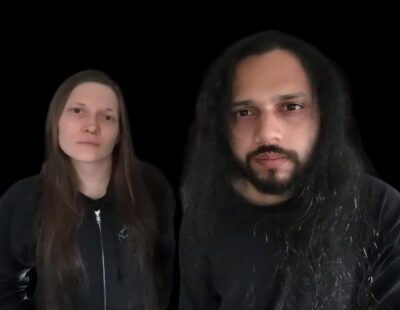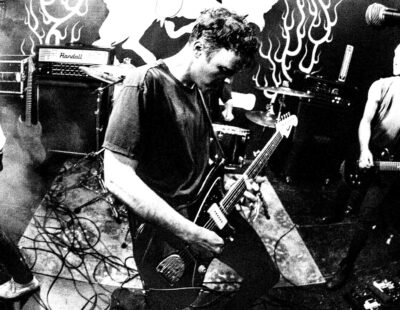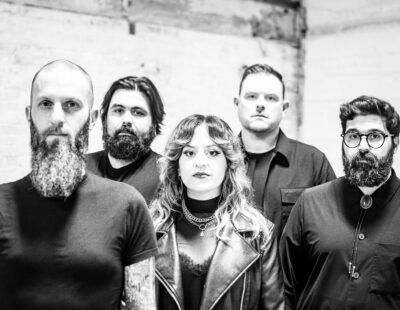** Hall of Famers Emperor are celebrating the 20th anniversary of black metal classic, In the Nightside Eclipse. As part of our journalistic duties, we couldn’t pass up a chance to talk to icon/good guy Ihsahn about two decades of black fucking metal and why this time Emperor are taking the stage with them to the grave.
What prompted you to re-start Emperor this time? Sure, In the Nightside Eclipse is celebrating two decades. And you’ve got Faust and Trym back as well.
Ihsahn: When we started doing this again—rehearsing—it was about the time I released by previous [solo] album. Not sure if you heard that, but it’s kind of experimental, but it comes from a very primal place inside. It’s very connected to the old-school black metal atmosphere. Even though musically they’re different, they come from a similar place. Having done that album it was pretty easy to get into the old songs again. With the lineup it’s the same as last time, except we had Faust on drums, which is working out really well. That was criteria to do this. I didn’t want repeat what we had done in 2006-2007. Just run through the whole album, preferably with Faust on drums, if you know what I mean. Trym has a different style from Faust. He [Trym] has a tendency to speed everything up. [Laughs] It’s nice to play the songs as they are on the album again. There’s a lot small details that Faust does that Trym didn’t do.
You didn’t tour much in the early ’90s. You had one tour—the UK tour with Cradle of Filth, if I’m not mistaken.
Ihsahn: Our UK tour was pretty much it apart from a few shows in Norway. That was pretty much it. Back in those days touring wasn’t really done in Norwegian black metal. There wasn’t a sketch. There was no second album, do a European tour, do the third album, do a European and US tour. None of that. It wasn’t organized like that back then.
Well, it wasn’t a cool thing to do for black metal back then either. Touring was a “life metal” job, even though Immortal and Marduk toured.
Ihsahn: It didn’t have the same priority. To me personally, it’s always been that way. I’ve only done a few shows considering I’ve been doing this for over 20 years. [Laughs]
Why is that, looking back on your time in Emperor?
Ihsahn: Well, I was a bit put off by the first European and US tours we did. I enjoyed playing the shows, but everything else around it… life on the road isn’t cut out for me. The tours were badly organized. There were drunken people everywhere. All the technical issues. It wears you out. Over the years, I picked up touring with my solo stuff. It’s not that I don’t like playing live though. I just prefer doing creative work in the studio. So, these last few years where I’ve been with Leprous as my backing band have been great. We only do like 8-10 shows per year. That’s best of both worlds for me.
Does nostalgia play into your recent live performances?
Ihsahn: No, not really. [Laughs] Nostalgia is something you have to be very aware of. When you’re playing a show—and I think most artist relate to this—you can’t really think about much. You’re just in your environment playing. When you start to think about too much that’s when you start to screw up. You have to be in the moment. At that point, it doesn’t really matter what the songs are.
In the Nightside Eclipse has a very special place in many hearts. Hearing these songs live again is important to people.
Ihsahn: I can relate to albums I grew up listening to that did something special for me. Like with Iron Maiden. It’s only then you can really connect. That’s when nostalgia hits. I mean if you listen to an album in your teens and suddenly you hear the album again years later, you can remember the smells, the thoughts, the places you hadn’t thought about in, say, 15 years. As people, we connect very strongly to music. I think we store music memories in a different way. Music, as an art form, is an abstract thing. It’s up to the listener to fill in the blanks to make it meaningful. Going back to not being too conscious while playing the songs, the audience is the opposite. They’re coming to see us because they have a strong connection to the music. This is a kind of music you can’t pull off just technically. It’s not that technical. It has to have an edge to it. An atmosphere to it. People aren’t easily fooled if you aren’t coming from an honest place with this type of music.
Keyboards weren’t exclusive to Emperor. But, I think, Emperor used the instrument more effectively than others. Why did you use keyboards as a scaping device?
Ihsahn: That was a result of our previous bands. Me and Samoth had our own bands prior to Emperor. In those bands, we had keyboards. I started out on keyboard when I was 6 or 7. I didn’t start playing electric guitar until I was 10 or 11. Emperor started out as a back-to-basics extreme black metal band with no keyboards. More of a punk attitude. As soon as that became a priority for our projects we started to add in the elements from our previous bands. I have to admit, as much as we listened to black metal, we listened to a lot of soundtracks. Horror movie soundtracks. Inspiration came from these big, grandiose, larger-than-life sounds. The orchestral parts added impact to our music. A lot of extreme metal is one-dimensional. There are no dynamics. I won’t say it’s boring, but it’s just full-on aggression. Black metal, as opposed to death metal, has more emotional depth. The vocal style and the music can be expressed without being too technical. It’s almost romantically melancholic. There’s a wider span in a way. I always missed that in extreme music. So, that’s why I wanted to put in layers of keyboards. Whatever to create swells in our music.
How old were you when you recorded In the Nightside Eclipse?
Ihsahn: By the time we got to record it I was 17.
Late teens. Most guys that age are out chasing girls, drinking beer, trying to find their place in this world. You were creating a black metal landmark.
Ihsahn: [Laughs] Well, we did that too. We were pretty normal in that sense. I do remember when we recorded the album, some of the other guys got to go to the pub. They were a bit older. People ask me that all the time. I remember that so well. The guys got to go to this rock pub in Bergen, where we recorded the album. I was kicked out the first night ’cause I wasn’t 18. So, I stayed in the studio with Pytten [aka Eirik Hundvin], doing vocals, keyboard layers, lead guitars while the other guys went to the pub. That spurred me on to the whole studio passion thing. [Laughs] But, remember, we were deep into this. It was a very strong subculture with very few people involved.
I always wondered why everyone went to Pytten early on.
Ihsahn: It was just that he did the Burzum stuff. The Immortal records. He did the Mayhem record. It was one of those studios that had good references. It was like the Florida studio that had all the death metal bands. Morrisound. Pytten isn’t a metalhead though. At all. [Laughs] He did country records. A lot of people remember him as a host of a youth program in Norway in the late ‘70s, early ‘80s. A lot of the black metal bands were teenagers, with hard empathies and sympathies, extreme philosophies, ways we looked at the world. He had absolutely no problem with that. He treated us a young people. With respect. He took us 100 percent seriously. But he understood we were young. He understood what we wanted to achieve. He understood that we wanted this sound, drenched in reverb with explosions going on. He was very open-minded. He still is. People his age are normally put off by what we stood for and would be much more moralistic about the bands and the guys in the bands. At the time, because we had such extreme views, we were confronted as adults. He managed to see through all that. He was a friend and a collaborator.
You were, as your solo debut correctly called, adversaries. Enemies of the state, so to speak.
Ihsahn: [Laughs] You’re right. The more we were confronted and the more opposition we faced, we had two choices: fall over or use it as more fuel. It was fuel for the fire for us. Peoples’ strong reaction to us meant we had impact. It underlined the differences between us and them.

Do you ever look back at the promo photos you took in the early ‘90s and laugh? Taken out of context they look a bit strange.
Ihsahn: Having done this for such a long time, the pictures go along with the album covers. You get used to them. It’s not like they pop up after 20 years and you’ve forgotten them. They are part of us. I still remember our mindset. At the time, we felt perfectly comfortable wearing make-up and dressing up for the photo sessions. Obviously, the mystique we were able to create back then you can’t do today. The Internet is everywhere. Sure, people then thought it was ridiculous too. Most of the magazines—at the time of Eclipse and Anthems—thought we were absolute idiots. The music was crap. Now, I see Eclipse next to Black Sabbath as “important albums” in the same magazines. It’s interesting and absurd to see how public opinion changes.
Time changes everything.
Ihsahn: It’s like that with all subgenres and subcultures. Eventually, they’re accepted.
Tattoos are good example. For years, tattoos meant you were an ex-convict, in the Navy, a biker, a drug addict, or someone who had a really terrible life history. Now, tattoos are everywhere.
Ihsahn: I see that in the small town I live in. I feel like my wife and I are the special ones now. We don’t have tattoos. [Laughs] I’m rather happy I don’t have the tattoos I wanted when I was 17.
Right. Like a huge Baphomet on your chest. Or a pentagram on your back.
Ihsahn: More or less. You’re spot on. [Laughs]
Why didn’t you get tattoos? I don’t have them either, which is probably tied to my strong sense of regret.
Ihsahn: Well, my parents basically told me I could get my driver’s license—the money for it—if I didn’t get tattooed back then. And there you have it. If I wanted to drive I couldn’t have tattoos. [Laughs]
OK, any chance of doing a US tour?
Ihsahn: With this lineup we didn’t bother getting work visas. The last reunion was without Samoth. Now, with Faust, it would be very far-fetched. You probably know why it wouldn’t work. [Laughs] It would be stressful to everyone. There’d be a lot of disappointment, I think. It would be great though. When we announced the shows last year, our manager had to turn down 60 offers. He’s now turned down over 100 offers. We got an offer to tour with Slayer and Marilyn Manson in 2007. Our record company wanted us to do it. So, it’s been no secret I’ve been reluctant to do the reunion again. I’m 38 now. I don’t want to message to be, “I give up. I can’t do anything new. So, I’ll just play the old classics.” I don’t want to be that guy. I mean, in 2006 we set out to do one show. We ended up doing much more than that. We want to keep this run short but sweet. Special. It’s been 20 years since Eclipse. Let’s celebrate that and move forward.
I think it’s pretty incredible Emperor gave you a career. That Emperor remains close to people is remarkable.
Ihsahn: It’s a huge privilege. Me and Samoth talk about this all the time. When me and Samoth started Emperor in ’91 and even when we recorded Eclipse, we had absolutely no commercial thoughts. At all. Making a living out of this wasn’t in our thoughts. Twenty years later, we played to 50,000 people at Hellfest. After, we grabbed a few beers and watched Black Sabbath. That’s not a bad day on the job is it? [Laughs] It’s pretty weird seeing the Emperor logo next to Black Sabbath and Aerosmith. Huge bands. We feel privileged, really. At the same time, we’re down to earth. We take it for what it is and to enjoy the moment. We want to respect our audience. They’ve made all this possible by keeping us in mind. When we quit in 2001 we were uncompromising. In all my career I’ve never compromised. I’ve been able to say “no” to anything I want. That makes me feel much better about what I’ve done and what I do today.
** Emperor’s In the Nightside Eclipse is out now as a remastered digibook and 2xLP. It’s available HERE. Chances are you already have it, but if you don’t, well, you’re missing out on a black metal great.






